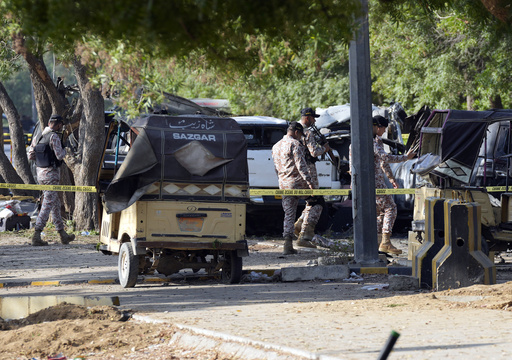A separatist group in Pakistan has taken responsibility for a brutal bombing that aimed at a convoy carrying Chinese nationals near the major airport in Karachi, resulting in the deaths of two Chinese workers and injuring eight individuals. The Baloch Liberation Army orchestrated the attack, marking the latest in a series of violent incidents targeting Chinese citizens in the country. This assault occurred just ahead of Pakistan’s scheduled hosting of a summit for the Shanghai Cooperation Organization, a security alliance established by China and Russia as a countermeasure to Western partnerships.
Initially, there was confusion surrounding the nature of the explosion, with Pakistani authorities initially suggesting it may have been linked to an oil tanker, but later confirming it was indeed a deliberate bomb attack. The aftermath of the bombing, captured in videos aired by Pakistani news outlets, depicted scenes of car fires and a dense plume of smoke billowing from the area. Security forces swiftly responded by securing the vicinity, while counterterrorism officials commenced investigations on the attacker’s entry into Karachi, Pakistan’s most populous city.
Among those wounded in the bombing were police officers who were accompanying the Chinese convoy during the assault. The spokesman for the Baloch Liberation Army, Junaid Baloch, divulged that a suicide bomber from their group targeted the convoy of Chinese engineers and investors as they exited the airport. Although the separatist organization primarily operates in the turbulent Balochistan province, it has carried out attacks on foreigners and security personnel in other regions of Pakistan in recent times.
The Chinese Embassy in Islamabad disclosed that Chinese employees from the Port Qasim Electric Power Company, a joint venture between China and Pakistan, were involved in the convoy when the attack unfolded around 11 p.m. In addition to the two Chinese casualties, one individual sustained injuries. The embassy confirmed Pakistani casualties as well but did not provide further details. Pakistan’s Ministry of Foreign Affairs denounced the bombing as a “heinous terrorist attack near Karachi airport,” extending condolences to the affected families and affirming their commitment to bringing the perpetrators to justice.
Prime Minister Shehbaz Sharif expressed shock and sorrow over the incident, condemning the assailants as enemies of Pakistan and assuring that they would face consequences for their actions. As Pakistan serves as a host to numerous Chinese workers as part of the Belt and Road Initiative, an infrastructure development project led by Beijing, tensions with the outlawed separatist group have escalated due to their demands for Balochistan’s independence and warning against any Chinese presence in the region.
The attack on Sunday mirrors previous violent episodes that targeted Chinese individuals, with the BLA previously storming the Chinese Consulate in Karachi in 2018. The province of Balochistan, known for its abundant oil and mineral resources, has been a focal point for ethnic Baloch grievances against perceived discrimination and exploitation by the central government, fueling a separatist insurgency. Notably, the region also grapples with the presence of Islamic militants, further exacerbating security challenges.
The continuous assaults on Chinese nationals underscore the elevated security risks in Pakistan, posing significant implications for the country’s collaboration with China on critical infrastructure projects. As investigations into the recent bombing unfold, the government faces mounting pressure to enhance security measures and deter future attacks targeting foreign citizens within its borders.
